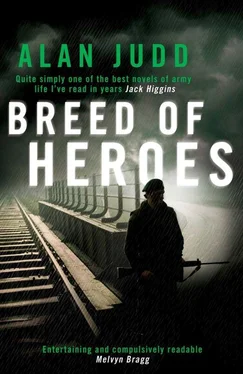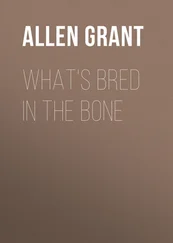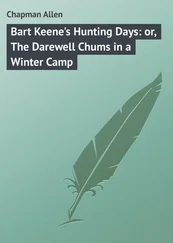The story was in time for the late morning editions. Beazely was content, the rest of the press happy, Anthony very pleased. He lit a cigar and drank black coffee. ‘Good night’s work, old boy. We can pat ourselves on the back, you and I. Spot of shut-eye now, I think. Advise the same for you.’
Charles returned to the sleeping area and stepped carefully over the blissfully unconscious Moore. What he saw next was Chatsworth squatting like a despondent Job amidst the ruins of the bunk. It was utterly smashed. Bits of cardboard and wood lay scattered all over the floor. Kit belonging to both of them was strewn everywhere. Only the sheet of corrugated iron was intact. ‘What happened?’ asked Charles.
Chatsworth looked up slowly, like a man rudely recalled from contemplation of eternal mysteries. ‘Don’t you know?’
‘No.’
‘That bird, the journalist. Moira.’
‘Did she do all this?’
‘She wasn’t alone.’
Charles recalled the rumour of Chatsworth’s assignation with her. ‘What have you done to her?’
‘Me? Nothing. It was what she did with half my platoon. She was supposed to meet me here but I was still with those bloody monks.’ He looked again at the devastation surrounding him. They spoke in undertones to avoid waking Moore. ‘It took me nearly a week to build. I’ll never be able to get the materials for another. I had to pinch them all as it was. And now she’s gone off in Henry Sandy’s ambulance.’
‘Is she badly hurt?’
‘She’s gone with Henry.’
‘Oh.’ Charles surveyed the mess. The prospect of sleep was receding rapidly. He knew he would get some somewhere at some time but at that moment he couldn’t imagine where or when.
Chatsworth looked at him thoughtfully. ‘D’you know something, Thoroughgood?’
‘What?’
‘You bring me bad luck. You’re a blight on my career. You come out on patrol with me and I get shot. You move into the Factory and pinch half my bunk and then you bring into the building the woman who destroys it during an orgy with half my own platoon, instead of with me as she was supposed to do. I go out and through my own initiative I discover just about the biggest arms haul ever found in Belfast and not only do I get no credit for it but it’s actually a black mark against me because the two people you recommend to help me panic and cock it up just at the vital moment. All the way along the line it’s you, Thoroughgood. Every time I have anything to do with you it goes wrong. The rest of my life is a great success.’
Chatsworth spoke flatly, without bitterness or anger. There was silence for a few seconds. ‘I’m only surprised you haven’t yet found a way of giving me the pox,’ he said morosely.
Charles forced a tired smile that was meant to be suggestive. ‘I may yet,’ he said and Chatsworth, for the first time in their acquaintance, looked just a little alarmed.
The arms find was indeed a big story. It received full local and national coverage. Everyone naturally assumed it to have been the object of the search operation the previous afternoon, which was itself said to have been the climax of a brilliant Army undercover operation. Everyone was pleased, though the Brigade Commander was a little irritated at first that such an event should have taken place entirely without his knowledge. Edward, though in a somewhat confused and indecisive state the next day, soon adopted an authoritative and knowledgeable air tempered by a becoming modesty about his own role in the business. Only Nigel Beale was unhappy, not just because he had come to in a manhole — where, so far as he was concerned, he had been left to die — but also because he suffered total amnesia regarding the events of the previous day and was unable to find anyone who could tell him what his part had been.
The CO, when he returned two days later, was pleased and jealous. Many of the congratulations were directed to him personally and he had been forced to accept them graciously despite his obvious uneasiness at the thought that the battalion could not only survive in his absence but actually flourish. ‘Glad to see you haven’t all been idle while I was away. Never any excuse for idleness,’ he said, and added, ‘No excuse for sloppiness now, though. They’ll want to get their own back. Must keep on the alert. Hard targets at all times.’
With the CO back and with the worsening situation in Belfast — four soldiers and two policemen killed in three days — Charles spent all his waking hours in battalion HQ, returning to the Factory only for brief and irregular periods of sleep. He and Chatsworth now slept side by side on the floor. As he became more tired he felt more remote from everything he did. He functioned without participating and responded without initiating. He lost all sense of control over his life and did not experience any sense of loss.
Many in the Army complained of having to fight with their hands tied behind their backs, as they saw it. They knew the terrorists and their leaders but were not allowed to kill them, nor to interrogate them properly. If arms or explosives were found they were not allowed to booby-trap the dump. There was a general recognition, though, that internment was not the answer since it was not seen to be just and it created a deep well of sympathy for the internees. Discussions about what should be done were repeated so often that a kind of conversational shorthand developed whereby attitudes and views could be conveyed simply by an introductory remark and no more, the rest being known already. Charles did not join in and his silence was taken for agreement. He sensed that this actually made him more popular, especially with the CO. In fact, he did not himself know whether his passivity was due to not caring or because he didn’t know what to think.
The routine was broken when, eight days before the battalion was due to leave and at about five in the afternoon, a foot patrol in the new estate came under fire from a single sniper. No one was hit but Private Williams, a red-haired Welshman who was tail-end-charlie to the patrol, risked his life to pick up a little girl who was standing near them and run with her to cover. There were four high-velocity shots from the direction of a block of flats but it was not possible to tell whether they came from within them or not. Whilst a follow-up search was being organised Private Williams discovered from the little girl where she lived and took her to her house, which was nearby. When he returned her to her mother, the woman spat in his face and said she would rather have seen the girl dead than saved by the Army. With a soldier’s sense of justice and chivalry, Private Williams pushed past her into the kitchen and beat up her husband before returning to his patrol. The family later complained and Private Williams had to be withdrawn for investigation and possible charging by the military police or RUC. When the CO was told he slammed down the ops room telephone so hard that the plastic case shattered and sent splinters flying about the room, leaving the guts of the machine exposed but surprisingly still working. He ordered his Rover Group and shouted at everyone in sight. Once again, Charles and Nigel Beale were the last to clamber into the Land-Rover as it lurched through the gates, treading on each other in their haste. It was not far but it was dark by the time they had reached the flats where the follow-up search for empty cases or weapons had been made, with no result. The CO said nothing until, as they were drawing up, a few token stones were thrown by a group of children on some waste ground. ‘What chance do those poor children have?’ he said to everyone near. ‘Some of their parents are not worth the bullets we ought to be expending on them.’
Читать дальше












